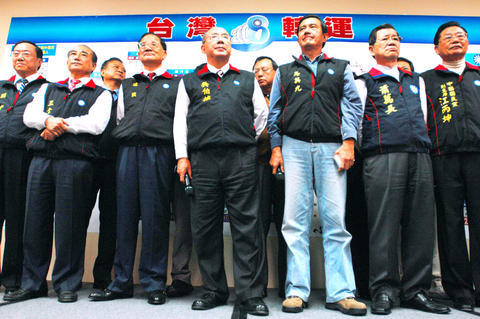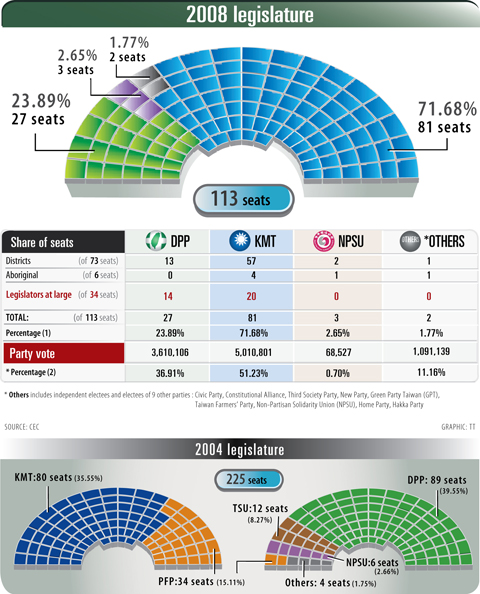The Chinese Nationalist Party (KMT) scored a resounding victory over the Democratic Progressive Party (DPP) in yesterday's seventh legislative elections, winning 81 seats, including 61 district legislator seats, to secure a two-thirds majority that gives it extra legislative powers.
The DPP, despite winning 38.17 percent of the total vote, garnered just 13 district legislator seats.
The Non-Partisan Solidarity Union (NPSU) came in third, with three seats, the People First Party (PFP) claimed one of the six Aboriginal seats and an independent candidate secured victory in Kinmen County.

PHOTO: CNA
The other parties -- including the Taiwan Solidarity Union (TSU) and the New Party -- faired poorly, with none of them reaching the 5 percent threshold required to win legislator-at-large seats.
As a result, the 34 legislator-at-large seats were split between the two main parties, with the KMT receiving 20 seats and the DPP 14.
The Central Election Commission (CEC) said overall turnout for the district legislative poll was 58.50 percent, or 10,050,619 voters.

Both referendums held in conjunction with yesterday's vote failed to attain the 50 percent turnout required for them to pass.
The DPP's plebiscite on recovering the KMT's stolen assets attracted 26.34 percent of voters, or 4,550,881 votes. It received a total of 3,891,179 affirmative votes.
The KMT-initiated referendum on empowering the legislature to investigate corruption involving high-level government officials had a 26.08 percent turnout, with 2,304,136 affirmative votes and 1,656,890 negative votes out of a total of 4,505,927 ballots cast.
In response to the results, President Chen Shui-bian (陳水扁) stepped down as DPP chairman.
Chen, calling the election loss the "worst setback" in the history of the party, told a press conference: "I should and I am willing to shoulder all of the responsibility."
"I resign as chairman, effective immediately. I feel very sorry and I feel shamed by this election result," he said.
KMT Chairman Wu Poh-hsiung (
Wu, with other party leaders at his side, including presidential candidate Ma Ying-jeou (
"I promise we will not abuse the power of the majority but we will use it to stabilize society and unite people, and we will respect the minority in parliament," Wu said.
The KMT's two-thirds majority would allow the party to impeach the president in its own right. In addition, with support from four other legislators, the KMT would have a three-quarters majority and could put constitutional amendments to a referendum.
"It is clear that people are yearning for change after eight years of suffering," Ma said.
He said "a more difficult task" lies ahead -- securing the presidency.
The KMT swept all eight seats in Taipei City, a goal it had dubbed "Sending Eight Immortals Across the Ocean" (
It marked only the second time since 1983 that all of the party's candidates for Taipei City had been elected, the city's Election Commission said.
The DPP had hoped legislative candidates Tuan Yi-kang (段宜康) and Wang Shih-Cheng (王世堅), in particular, could upset their KMT opponents.
Tuan declared defeat at about 6:48pm after trailing KMT opponent Lin Yu-fang (
"I will move on after reflecting deeply. What is more disappointing was the defeat of the DPP overall. There may be a lot of reasons for our defeat, but we will shoulder the responsibility together," Tuan said at his campaign headquarters.
The KMT also won all six seats in Taoyuan County, with all its candidates declaring victory before the official results were announced.
In Taipei County, the KMT won 10 of 12 seats, though DPP candidate and singer/actor Yu Tian (余天) won for the DPP in Sanchong (三重) -- a pan-green stronghold -- defeating his KMT opponent Chu Chun-hsiao (朱俊曉) by just 2,000 votes.
Both Yu and Chu Chun-hsiao declared victory before the Sanchong City Office announced Yu's victory, sparking concern over the result.
Police were dispatched to prevent conflict as supporters of candidates converged on the area.
As expected, KMT Legislator Wu Yu-sheng (
The KMT won 19 of the 21 legislative seats in Miaoli County, Taichung County, Taichung City, Changhua County, Nantou County, Yunlin County, Chiayi County and Chiayi City, losing only Taichung County's second constituency and the second constituency of Chiayi County.
In Changhua County, the KMT took all four seats, with Cheng Ju-fen (
In Chiayi City, the KMT's Chiang Yi-hsiung (
In southern Taiwan, a DPP stronghold, the party lost its dominance in two of the five cities and counties.
The KMT prevailed in three of five districts in Kaohsiung City, with incumbent DPP Legislator Kuan Bi-ling (
The KMT also won three out of the four seats in Kaohsiung County, with only DPP Legislator Chen Chi-yu (
Three-term KMT Legislator Lin Yi-shih (
The KMT's performance in Kaohsiung County was extraordinary, as in the legislative poll in 2004, the pan-green camp garnered 55.73 percent of the vote in Kaohsiung County while the pan-blue camp won only 39.76 percent of ballots.
The DPP managed to win two seats in Tainan City by narrow margins and two out of the three seats in Pingtung County.

CHAOS: Iranians took to the streets playing celebratory music after reports of Khamenei’s death on Saturday, while mourners also gathered in Tehran yesterday Iranian Supreme Leader Ayatollah Ali Khamenei was killed in a major attack on Iran launched by Israel and the US, throwing the future of the Islamic republic into doubt and raising the risk of regional instability. Iranian state television and the state-run IRNA news agency announced the 86-year-old’s death early yesterday. US President Donald Trump said it gave Iranians their “greatest chance” to “take back” their country. The announcements came after a joint US and Israeli aerial bombardment that targeted Iranian military and governmental sites. Trump said the “heavy and pinpoint bombing” would continue through the week or as long

TRUST: The KMT said it respected the US’ timing and considerations, and hoped it would continue to honor its commitments to helping Taiwan bolster its defenses and deterrence US President Donald Trump is delaying a multibillion-dollar arms sale to Taiwan to ensure his visit to Beijing is successful, a New York Times report said. The weapons sales package has stalled in the US Department of State, the report said, citing US officials it did not identify. The White House has told agencies not to push forward ahead of Trump’s meeting with Chinese President Xi Jinping (習近平), it said. The two last month held a phone call to discuss trade and geopolitical flashpoints ahead of the summit. Xi raised the Taiwan issue and urged the US to handle arms sales to

BIG SPENDERS: Foreign investors bought the most Taiwan equities since 2005, signaling confidence that an AI boom would continue to benefit chipmakers Taiwan Semiconductor Manufacturing Co’s (TSMC, 台積電) market capitalization swelled to US$2 trillion for the first time following a 4.25 percent rally in its American depositary receipts (ADR) overnight, putting the world’s biggest contract chipmaker sixth on the list of the world’s biggest companies by market capitalization, just behind Amazon.com Inc. The site CompaniesMarketcap.com ranked TSMC ahead of Saudi Aramco and Meta Platforms Inc. The Taiwanese company’s ADRs on Tuesday surged to US$385.75 on the New York Stock Exchange, as strong demand for artificial intelligence (AI) applications led to chip supply constraints and boost revenue growth to record-breaking levels. Each TSMC ADR represents

State-run CPC Corp, Taiwan (CPC, 台灣中油) yesterday said that it had confirmed on Saturday night with its liquefied natural gas (LNG) and crude oil suppliers that shipments are proceeding as scheduled and that domestic supplies remain unaffected. The CPC yesterday announced the gasoline and diesel prices will rise by NT$0.2 and NT$0.4 per liter, respectively, starting Monday, citing Middle East tensions and blizzards in the eastern United States. CPC also iterated it has been reducing the proportion of crude oil imports from the Middle East and diversifying its supply sources in the past few years in response to geopolitical risks, expanding